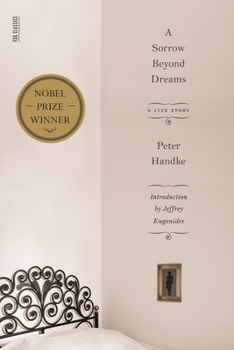A Sorrow Beyond Dreams: A Life Story
Select Format
Select Condition 
Book Overview
Nobel Prize winner Peter Handke--"the extravagantly talented Austrian playwright of chutzpah, novelist of sensibility, poet of linguistic games" (Kirkus)--ponders the life and early death of his mother
"The Sunday edition of the K rntner Volkszeitung carried the following item under 'Local News': 'In the village of A. (G. township), a housewife, aged 51, committed suicide on Friday night by taking an overdose of sleeping pills.'"
So opens A Sorrow Beyond Dreams, Handke's reckoning with his mother's life--which spanned the rise of the Nazis, World War II, and postwar suffering--and death. Both stark and lyrical, full of love, anger, admiration, and a keen sense of history, this slim book reveals Handke at his most lucid and direct. It is the most moving and accessible work in his distinguished career; it is "indispensable" (Bill Marx, The Boston Globe).
Customer Reviews
A lacerating yet loving account of a life; like no other I know
A Sensitively Valuable Elegy
Short,Brutal and Unforgettable
The finest auto/biographical work I know
a postmodern biography with depth, bite, and poignance
Wunschloses Unglück Mentions in Our Blog

Unlike many literary prizes, the Nobel Prize is based on a body's author of work as a whole, rather than an individual title. This year's Nobel Prize for Literature has been awarded to Norwegian playwright Jon Fosse. Read on to learn about his impact, as well as that of winners from the past seven years.






